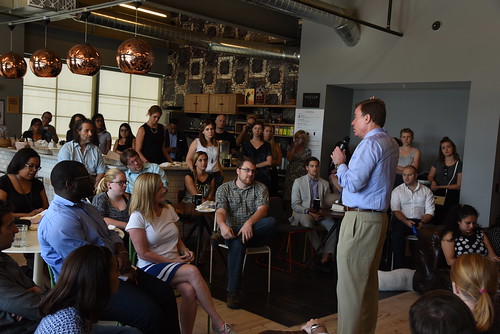In the News
By: Andy Medici

When U.S. Sen. Mark Warner looks at companies such as Uber, Lyft, InstaCart and others he sees more than disruptive technology — he sees a fundamental shift in the very nature of employment.
The Virginia Democrat has been a Capitol Hill leader in untangling how policymakers and politicians should approach an economy focused more on cobbling together work from multiple sources, rather than the 20th century relationship between a formal employer and employee.
As a former tech entrepreneur and venture capitalist, Warner wants to find a way to support innovation and new technologies while making sure workers are not left out in the cold. We talked Thursday about the gig economy and how we need to re-imagine the social contract that has defined so much of the last few decades, starting with employee classifications.
“Right now you are either a W-2 or 1099,” Warner said, referring to the tax filings of traditional full-time employees and independent contractors. “I don’t believe in the future that it’s just going to be a binary choice. There may need to be a third classification.”
The idea of whether people who work for Uber and others are employees or independent contractors is playing out in courtrooms across the land. Uber board member and former Obama adviser David Plouffe visited tech incubator 1776 this week to showcase what the ride-sharing startup is doing for D.C. residents. Uber has about 27,000 drivers in the D.C. area, Plouffe said.
Warner said policymakers need to tackle these issues before they become large problems — and before they evolve into Republican and Democratic issues.
“The one thing everybody knows is that unless this is stopped by litigation, this wave is going to continue to come. The trick is can we get ahead of it on a policy way before everybody gets into their partisan crouches,” Warner said.
But any step toward change will require an untangling of the Gordian knot in which the gig economy and politicians currently find themselves.
Those issues include:
· A lack of data. Current estimates pin the number of independent contractors somewhere between 3 million and 50 million, with gig economy workers probably around several million, but the data is unreliable, Warner said. And because of the intense competition in the space, companies are less likely to share their numbers openly.
· A web of lawsuits. Warner thinks companies such as Uber might be open to experimenting or piloting new programs in job training and other areas for their workers but can't for fear of exposing themselves in lawsuits currently against them. So pilot programs involving some sort of benefit are off the table at the moment, he said.
· Benefit portability. Currently most workers receive their benefits, such as health care or retirement programs, through their employers. In order to make the gig economy work, benefits need to be tied more closely to the individual and not the business. That's the case in many European nations, Warner said, making a freelance life more economically feasible.
Even the types of benefits workers receive might need to change — how do we create programs that allow people to live in the gig economy without constantly falling back into government assistance programs when the economy eventually slows down periodically? And benefits that provide income security might also be better managed through third-party organizations. In the middle of the 20th century, some benefits programs were administered by unions, Warner said.
Companies such as Uber might be ready and willing to experiment with new types of benefits, policies and worker classifications if politicians can figure out a way to provide breathing room for pilot programs and new initiatives geared toward worker security.
"I think many of the companies are willing to lean in because they have the threat of top-down regulation or [ongoing] litigation," Warner said.
But what matters most is that policymakers need to start devising solutions for a rapidly changing economy.
“The 20th century model doesn’t work in an age when you can monetize your parking space,” Warner said.